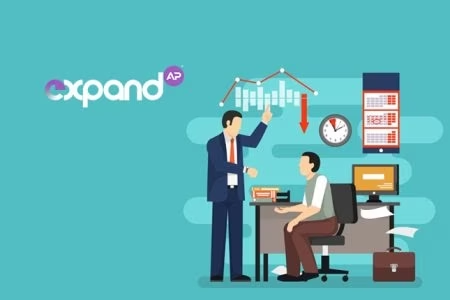Make Your Salesforce accounts payable management fast, accurate, and easy.
press
See the events where you can meet the ExpandAP team, get details about our impact on the industry and explore company news and insights.
What AP Professionals Need to Know About Travel Reimbursements
By Paul Wnek | August 28, 2024 | Link to Article →

Business travel has certainly established a new normal, especially after a few short years of pandemic-fueled virtual meetings and conferences. Many employers and employees, as a result, remain unclear on what does and does not qualify as a reimbursable business travel expense.
State regulations further complicate corporate taxes in the United States. Not only does each state determine its tax rate, but the rules about what qualifies as a tax credit or a tax deduction also vary. With state and local tax laws always in flux and more employers hiring remote workers, it’s hard to keep track of which expenses are tax deductible for businesses and individuals.
Federal Corporate Taxes
Taxing corporate profits and earnings helps support federal government initiatives, including public services and infrastructure. Today’s corporate tax rate of 21% was determined in 2017 by the Tax Cuts and Jobs Act (TCJA); the previous rate was 35%.
Corporate taxes are a better alternative for businesses than paying excess income tax, as they allow a business to deduct expenses such as employee salaries, healthcare benefits, and other business expenses.
Corporate Laws Vary by State
In 1911, Wisconsin became the first state to begin collecting its own taxes from businesses and individuals. More states followed with Ohio and Florida being the last two states to levy corporate taxes in 1971.
While tax laws vary widely across states, corporations are typically taxed on their total net income, sold assets/capital gains, payroll, excisable goods, and property value. Each state is responsible for determining tax rates, deductions, and credits.
The differences among the 29 states and the District of Columbia with a flat rate corporate tax are significant—from 2.5% in North Carolina to 11.5% in New Jersey. Only South Dakota and Wyoming have no business tax at all. North Carolina is phasing out its corporate income tax and is due to join them by 2030. This sliding scale can potentially influence decisions about where the business will plant its roots and expand.
These variations in tax rates and rules also make tax season quite complex for businesses with multi-state offices. To complicate matters, some states impose gross receipts taxes instead of or in addition to corporate taxes.
Nevada, Ohio, Texas, and Washington impose gross receipts taxes instead of corporate income taxes. Delaware, Oregon, and Tennessee add gross receipts taxes on top of corporate income taxes. Pennsylvania, Virginia, and West Virginia allow gross receipts taxes at the local, not state, level in addition to imposing corporate taxes.
Gross receipts taxes face some controversy among economists and others who argue that graduated rates encourage businesses to mitigate the expense of higher marginal rates with wasteful practices. It can also result in tax pyramiding, whereby the same item is taxed multiple times throughout its production process. Tax pyramiding is particularly harmful to businesses with lower profit margins, leading to higher prices and consumers making up for lost profit.
As an example of tax pyramiding, consider all that goes into making and selling a piece of furniture. By the time the furniture piece makes it to the showroom floor, it has been taxed by a logger, a lumberyard, a furniture manufacturer, and then the furniture store. Since each level of the pyramid must boost its price to account for taxes paid and still make a profit, that higher price is passed along to the customer.
A complete list of state corporate income tax rates for 2024 is available through Tax Foundation.
Travel Expenses: Tax Write-Offs for Individuals
Individuals who travel for their job are typically eligible for reimbursement from their employer, but some expenses are not reimbursable. For example, a business might offer a per diem for meals, and the traveler spends more than the per diem. In this case, individuals may be able to deduct the excess expense from their personal tax return. The IRS allows tax write-offs for expenses that are ordinary and necessary. This may include transportation costs, lodging, meals, business services such as internet access while traveling, and even incidentals like dry cleaning.
Business travelers may be subject to value-added tax (VAT) when traveling internationally. More than 170 countries charge VAT on goods and services, and while some VAT payments are reimbursable, the VAT for lodging and meals is not eligible.
Travel Expenses, Reimbursements: Tax Write-Offs for Corporations
For businesses, taxation of travel expenses and reimbursements to employees is not so simple. When travel expenses are reimbursed as part of an employee’s taxable income, the reimbursement is considered income tax. Since paying taxes on travel reimbursements benefits neither the employee nor the employer, most businesses opt for ad hoc payments.
Travel reimbursements paid from employers to their employees are eligible for a tax write-off, including necessary expenses such as transportation, lodging, and incidentals like tips and business communication expenses. The business needs to follow rules about deductions and credits in each state and/or jurisdiction where the business operates, both to ensure compliance and to maximize their returns. This can include documentation such as receipts and travel logs to support the business nature of the expense, whether per diems are permitted for meals and other incidentals, and rules for the self-employed or business owners.
Automating Travel Expense Reimbursement Processes
Technology assists with both tax preparation and can automate the travel expense reimbursement process.
Key features of the leading automated expense management software include the following:
- Receipt scanning and expense categorization
- Approval workflows that direct expense reports to the right managers for review
- Procedures to ensure timely processing of employee expense reports
- Integration with a company’s accounting systems
- Direct deposit options to reduce manual processes and administrative overhead
- Data security to protect personal financial information
- Automating travel expense reimbursement processes improves efficiency, accuracy, and can even help boost employee morale
Artificial intelligence (AI) not only replaces data entry and other time-consuming tasks, it can produce insights, extract information from receipts, and identify outliers to improve accuracy. These insights can also reduce overall costs by identifying opportunities for vendor savings, flagging redundancies and more—ultimately impacting the overall business strategy.
Advances in technology and changing regulations will continue to transform corporate tax preparation and travel expense reimbursement processes each year. Using automation and AI, businesses can ensure compliance and accuracy while improving efficiency. Digital solutions will not only improve the speed and ease of completing these processes, but provide better tracking and recordkeeping to reduce costs within the corporation.
- Tags: accounting, accounting positions, accounting programs, accounts payable, accouting shortage, accouting teams, AI, analytics capablities, artificial general intelligence, automation, data entry, financial, financial leaders, labor stats, resource gap, transaction processing
Schedule a free demo today.
We’re eager to show you more about how ExpandAP saves time and resources for your organization. Book a demo and see how you can streamline expense management and accounts payable processes.






